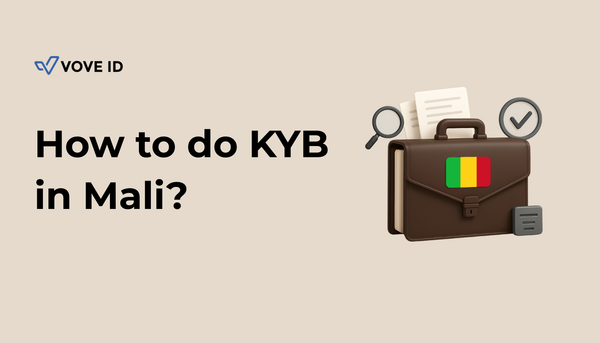AML Compliance in the UAE: A 2025 Guide for Startups and Fintechs
Discover the 2025 landscape of AML compliance in the UAE. Learn how fintechs, DNFBPs, and startups can navigate regulations, eKYC, and digital onboarding with solutions like VOVE ID.

The United Arab Emirates (UAE) has positioned itself as a global financial hub, attracting fintechs, crypto exchanges, and international investors. But with rapid growth comes the need for strong defenses against financial crime. In 2023 alone, the Ministry of Economy imposed fines worth over Dh 339 million on businesses for Anti-Money Laundering (AML) violations.
For startups, compliance is not just a regulatory checkbox — it’s the foundation for sustainable growth and trust. This guide explores how AML compliance works in the UAE, what challenges businesses face, and how solutions like VOVE ID can help streamline compliance without slowing innovation.
AML Regulatory Framework in the UAE
AML and Counter-Terrorist Financing (CTF) in the UAE are governed by Federal Decree-Law No. 20 of 2018 and its amendments, aligning with Financial Action Task Force (FATF) standards. Key regulators include:
- UAE Central Bank (CBUAE): oversees banks, fintechs, and money service businesses.
- Ministry of Economy: supervises DNFBPs (real estate, law firms, auditors, dealers in precious metals and stones).
- Securities and Commodities Authority (SCA) & VARA: regulate virtual assets and crypto service providers.
- Financial Intelligence Unit (FIU): collects and analyzes suspicious transaction reports via the goAML system.
In 2024, the UAE was removed from FATF’s grey list after strengthening its AML regime, signaling credibility to global investors and boosting foreign direct investment inflows.
AML Obligations for Businesses
Companies operating in the UAE must comply with the following obligations:
- Customer Due Diligence (CDD) and Enhanced Due Diligence (EDD): verifying customer identity and monitoring high-risk relationships.
- eKYC & Digital Identity Verification: using digital tools to streamline onboarding while meeting regulatory standards.
- Suspicious Transaction Reporting: filing reports via the goAML platform.
- Risk-Based Approach: tailoring controls based on customer risk, sector, and transaction type.
- Training and Governance: ensuring employees understand AML requirements and procedures.
For startups and fintechs, manual compliance is often impractical. This is where automated solutions become essential, reducing human error and ensuring regulatory readiness from day one.
Key Challenges for Startups
Despite the UAE’s strong AML framework, many early-stage companies struggle with:
- Budget limitations: hiring a full compliance team is costly.
- Integration hurdles: connecting eKYC tools with in-house platforms can be complex.
- Balancing speed and compliance: users expect instant onboarding, but regulators demand thorough checks.
- Sector-specific scrutiny: DNFBPs, fintechs, and crypto businesses face different but equally strict requirements.
One example is real estate, where agents must verify the source of funds for high-value property transactions. Another is crypto exchanges, which are required to implement blockchain analytics alongside KYC.
Acknowledging these pain points makes clear why many startups turn to modular, API-based solutions, which adapt to different compliance needs and scale with the business.
Role of Digital Identity and eKYC
The UAE’s push toward digital transformation has made eKYC a cornerstone of AML compliance. With high mobile penetration and growing demand for digital onboarding, businesses are turning to:
- Biometric verification (face match, liveness detection).
- Document authentication (passport, Emirates ID, residency permit checks).
- API integrations for instant CDD and ongoing monitoring.
Solutions such as VOVE ID empower fintechs, DNFBPs, and VASPs to perform seamless onboarding while staying compliant. Instead of slowing down growth, eKYC becomes a driver of customer trust and operational efficiency.
FAQ on AML Compliance in the UAE
❓ Is AML compliance mandatory for crypto companies in the UAE?
Yes. Virtual asset service providers (VASPs) are regulated by the SCA and VARA, and must comply with AML/CFT rules, including KYC, transaction monitoring, and suspicious reporting via goAML.
❓ What is the goAML system?
goAML is an electronic reporting platform developed by the UNODC and adopted by the UAE’s FIU. Businesses must register and use it for suspicious activity reporting.
❓ What are the penalties for non-compliance?
Penalties range from fines (up to Dh 5 million per violation) to license suspension. In 2023, total fines exceeded Dh 339 million.
❓ How can startups balance fast onboarding with strict AML checks?
Automated identity verification tools, biometric checks, and API integrations allow startups to remain compliant without compromising speed.
❓ Are DNFBPs covered by AML rules?
Yes. Real estate agents, law firms, auditors, and dealers in precious metals/stones are under the Ministry of Economy’s supervision and must comply with AML regulations.
Practical Tips for Startups Navigating AML in the UAE
- Start small but stay compliant. Have at least a basic AML policy, designated compliance officer, and staff training in place.
- Leverage modular solutions. Use flexible AML/KYC tools that scale with your business, like the API-driven identity verification.
- Integrate compliance early. Embed CDD and KYC checks directly into onboarding flows to avoid costly redesigns later.
- Stay updated. Monitor guidance from the Central Bank and Ministry of Economy; regulatory expectations evolve quickly.
- Prepare for inspections. Keep clear records. Automated audit trails make regulatory reviews easier.
Conclusion
The UAE’s AML compliance environment is one of the most advanced in the region. For startups, it represents both a challenge and an opportunity. By embracing digital identity, eKYC, and risk-based approaches, businesses can meet regulatory expectations without slowing down innovation.
Solutions such as VOVE ID support this journey by offering scalable, automated compliance tools tailored for fintechs, DNFBPs, and startups operating in the UAE. In a competitive and tightly regulated market, having the right AML strategy is not just about avoiding fines, it’s about building long-term trust with customers and regulators alike.
Ready to streamline your AML processes? Explore VOVE ID and see how your business can stay ahead in 2025.




